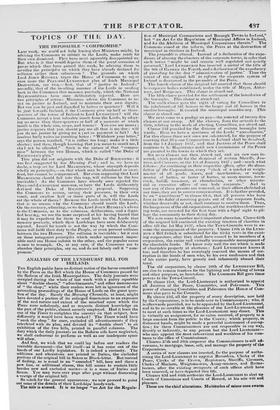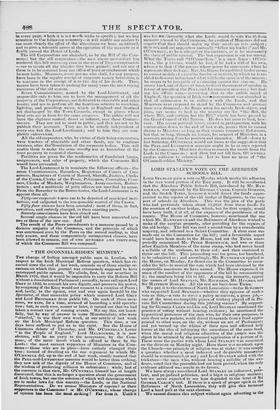ANALYSIS OF THE LYNDHURST BILL FOR IRELAND.
THE English public have no distinct notion of the havoc committed by the Peers on the Bill which the House of Commons passed for the Reform of the Irish Municipalities. The daily journals were occupied during the whole of last week with a paltry squabble about "double sheets," "advertisements," and other meannesses of " the shop ;" while their readers were left in ignorance of the astounding proceedings of the House of Lords on the great ques- tion of the day. Suiely the Morning Chronicle, at least, might have devoted a portion of its enlarged dimensions to an exposure of the real nature and extent of the mischief unon which the Peers were sedulously, and as respects distinct knowledge on the part of the public, almost secretly employed. Had it been the cue of the Times to enlighten the country on that subject, how differently it would have been worked! The Times would have ." sunk the shop S' for once, excluded all advertisements if they Interfered with its plan, and devoted its "double sheet" to an exhibition of the two bills, printed in parallel columns. The duty which the daily journals on the Reform side have neglected, we shall endeavour to perform as well as our inadequate space will allow.
And first, we wish that we could lay before our readers the veritable document—the bill itself—as it has come out of the hands of our Lordly legislators. It is indeed a curiosity. The .additions and alterations are printed in Italics, the excluded portions of the original bill in Saxon or Black-letter. But instead of finding, as is usual in an "amended" bill, here and there a new line, or additional clause, this bill seems to contain little besides new and excluded matter—it is a mass of Italics and Saxon. You may turn over page after page without discerning a vestige of the original bill.
So tench for the general appearance; we now proceed to point -out some of the details of their Lordships' handy work.
The title is altered. It is no longer "an Act for the Regula-
tion of Municipal Corporations and Borough Towns hi Ireland," but " an Act for the Regulation of Municipal Affairs in Ireland, and for the Abolition of Municipal Corporations therein." The Commons aimed at the reform, the Peers at the destruction of municipal in in Ireland.
The preamble is altered. Instead of a declaration of the expe. dienct of altering thecharters of the corporate towns, in older that such towns " might be and remain well regulated and quietly ooverned," Lord IvuovitlasT has inserted a recital of the title of the 9th of GEORGE the Fourth. and a declaration of the expediency of providing for the due " adminisnation of' justice." Thus the intent of the original bill to riform the corporate 53 stem of behind is disavowed in the preamble of the Peers. The fourth choose of the orignial bill enacted that there should be corporate bodies established, under the title of 110 or, Alder- men, and Bmgesses. This clause is struck out.
The fifth clause presided for the settlement of the boundaries of the boroughs. Thiv clause is struck nut.
The sixth clause gave the light of voting for Councillors to the inhabitants of 10/. houses in the larger and 5/. houses in the smaller boroughs. It created the municipal constituency. This clause is struck out.
We next come to a prodioi-us pap—the removal of twenty-five clauses at one swoop. All the clauses, from the seventh to the 351b, relating to the mode of electing Councillors, are struck out.
Clause 33d provided for the division of certain boroughs into wards. Hem we have a specimen of the Lords " atnendinents." For this clause three new ones are substituted, for the purpose of enacting that filly-one Corpoiations in Ireland shall be dissolved, front the lst January 1837, and that Justices of the Peace shall continue to he Magistrates until new Commissions of the Peace are granted to the towns in whieh they act.
Six more clauses are then struck out, and six new ones in- serted, a hick provide for the dismissal of certain Sheriffs, Jus- tices. and Coroners, on the 1st ofJamiary 1837 ; and—mark what Wows—for continuing in their respective ngices, alter the disso- lution of the Coiporations, every " eleik of a market or weigh- master of all goods, wares, and merchandise, or weigh- master of butter, or taster of butter, or assay-master, town- e'er k, bailiff, treasurer, or chamberlain, or other ministe- rial or executive racer of any body corporate.' And in case any of these persons are removed, or their offices abolished at any time, they are to receive compensation. It is further provided, by an " amendment" to clause 615t, that all persons who have been in the habit of receiving grants out of the corporate funds, whether deservedly or not, shall continue to receive them. Titus, the hangers-on of the old corporations, all the worthless electioneer- ing tools, are invested for the first time with a legal right to pil- lage the community to their rly ing day. We now come to another most important alteration. Clause 65th of the original bill continued the existing trustees of charities in office till the 1st May 1837, when the Town-Councils were to as- sume the management of the property. Clause 19th in the Lynn- BURNT Bill (which is substituted for the 651h) vests in the exist- ing corporators, after they shall have ceased to be members of a corporation, the entire and virtually irresponsible management of the charitable funds. We know very well the use which is made of charitable property at elections : Lord LYsirounasT knows it too; and therefore he has cunningly reserved the means of cor- ruption in the hands of men who, by his own confession and that of his entire party, have grossly and infamously abused their trust.
The old corporators, by clause 20th of the LYNDHURST Bill, are also to remain trustees for the lighting and watching of towns and other purposes, as heretofore. The Commons Bill gave these powers to the Town-Council.
By clause 21st, the Lord-Lieutenant is authorized to appoint all Justices of the Peace, Constables, and Policemen. This power of choosing Constables and Policemen the House of Com- mons also gave to the Councils.
By clause 23d, all the property of every description, now held by the Corporations, is to he made over to Commissioners; who, it is afterwards provided, are to be appointed by the Lord-Lieutenant, and to be removable at the pleasure of the Lord-Lieutenant, and to meet at such times as the Lord-Lieutentant may direct. This is virtually an assignment, for no value received, of property to a large amount from the public to the Crown; which property, in dishonest hands, might be made a powerful instrument of corrup- tion; for these Commissioners are not responsible in any way, directly or indirectly, to any person but the Lord Lieutenant— who may appoint the most subservient and worthless of his crea- tures to the office of Commissioner.
Clauses 37th and 39th empower the Commissioners to sell ad- vowsons, to mortgage, lease, sell, and manage the property of the Corporations. A series of new clauses are inserted, for the purpose of autho- rizing the Lord-Lieutenant to appoint Recorders, Clerks of the Peace, Clerks of the Crown, Registrars, Sheriffs, Coroners, Clerks of Markets, Weighmasters, Assay-masters, and Butter- tasters, after the existing occupants of such offices Shall have been removed, or have departed this life. Clauses 83d and 84th authorize the Lord-Lieutenant to shut up Courts of Conscience and Courts of Record, at his sole will and pleasure. These are the chief alterations. Multitudes of minor ones swarm
it' every page, which it is not worth while to specify ; but we beg attention to tlee following summery—it will enable our readers to see more clearly the effect of the alterations we hove mentioned,
and to give a tolerable emcee at the operation of the measure as it finally passed the House of Lords.
The old Corporatiens are abolished, as by the Bill of the Com- mons; but the old corporators—the men whose misconduct has rendered this bill necessary even in the eyes of Tory corrupt ionists —are to retain all the plunder they have gained; and not one of them is to be removed from any cave of trust or emolument which Ile now holds. Moreover, every person who shall, for any purpose, Imes been in the regular receipt of corporate money heretofore, is to continue in the receipt of it to the day of his death. Thus, means have been taken to prolong for many years the most crying nuisances of the old system.
Seven Commissioners, named by the Lord-Lieutenant, and responsible only to him. are to have the management of all the property of the Corporations:, not dedicated to charitable and other trusts; and are to perform all the functions relative to watching, lighling, and providing water. which in England and Scotland are discharged by the TowteCouncits, except in places where local acts are in force for the same purposes. The public will not have the slightest control, direct or indirect, over these Commis- sioners. They are not to meet in public, and they are not to be publish their accounts. They are to be utterly independent of every one but the Lord-Lieutenant ; and to him they are com- pletely subservient.
All the old corporators, who, by virtue of' their being con orators, were trustees of charitable and other funds, are to continue
trustees, after thedissolution of the corporate bodies. This will enable them to make the same worthy use as heretofore of the trust property in contested elections.
Facilities are given for the confirmation of fraudulent leases, assignments, and sales of property, which the Commons Bill would have prevented.
The Lord-Lieutenant is to nominate the following officers—the seven Commissioners, Recorders, Registrars of Courts of Con- science, Registrars of Courts of Record, Sheriffs, Justices, Clerks of the Crown, Clerks of the Peace, Policemen, Constables, Coro- ners, Clerks of Markets, Weighmasters, Assay-masters, Butter- tasters ; and a multitude of petty officers not specified by name. From the Recorder to the Butter-taster, the Lord-Lieutenant is to appoint them all.
Fifty-one cmporate towns are to be deprived of municipal insti- tutions, and subjected to the irresponsible control of the Crown. Fifty-four clauses have been amended ; most of them, in fact, rewritten, and entirely changed, in their enacting parts. Senenty-nineclauses have been struck out.
Several single clauses in the old bill have been converted into two or three of the new one. And
The result of the Peers amendments to a measure passed by a decisive majority of the Commons, and the principle of which was sanctioned even by the Peers on the second reading, is that only EIGHT, and these comparatively unimportant clauses, have been allowed to remain, out of ONE HUNDRED AND FORTY-ONE, of which the Commons Bill was composed.



























 Previous page
Previous page